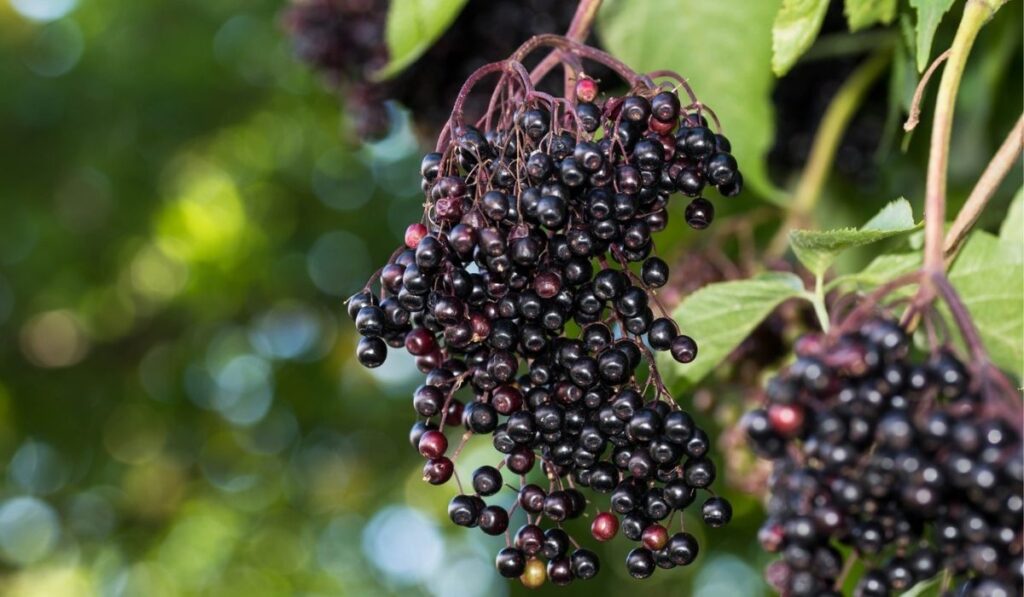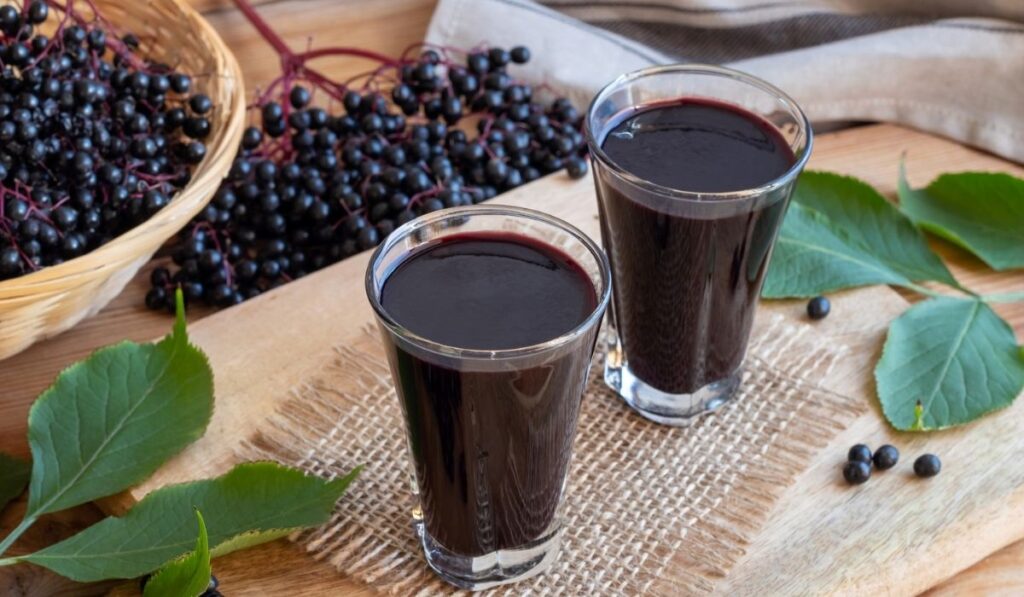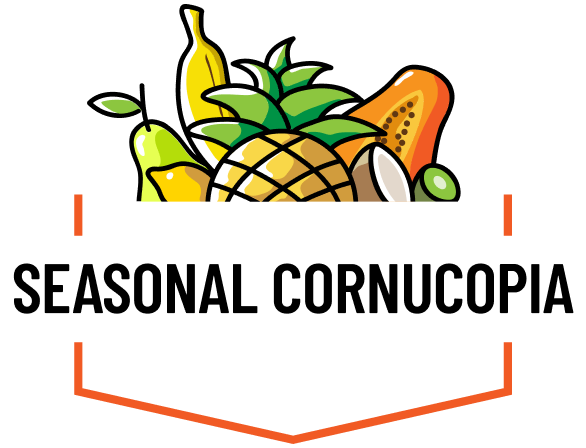Elderberries are a popular summer treat with multiple health benefits, packing nutrients that boost your immunity, reduce inflammation and stress, and protect your heart. And if you want to eat elderberries, or use them in pies, syrup, or wine, learning when they’re in season is essential.
Elderberries are a summer fruit in season from mid-August to mid-September. Variations in climate and the different cultivars determine the exact timing of the elderberry season near you. Elderberries are hardly available at grocery shops, but you might find a vendor online or at a specialty store.
Elderberries are in season in late summer, though some regions have early or late elderberry seasons. The different climates and elderberry cultivars also cause variations in the elderberry season across the country. Let’s find out more about when elderberries are in season in your area and how to buy and use the fruits.
What are Elderberries?

Elderberries are small fruits that grow on an elderberry shrub (Sambucus canadensis). The shrub bears small white/cream elderflowers and is native to Central Europe and North America.
The most common shrub varieties are the European elderberry (Sambucus nigra) and the American elderberry (Sambucus canadensis).
Cultivar varieties have been developed for unique qualities; Beauty, Black Lace, Nova, Variegated, Scotia, and York. Some cultivars are for ornamental use, while others are rich in nutrients, making them suitable for consumption.
Benefits of Elderberries
The tiny blue or black elderberries are low-calorie fruits packing lots of nutrients, including Vitamin A and C. In addition, they are chock-full of antioxidants such as kaempferol, phenolic acids, quercetin, and isorhamnetin.
The antioxidant anthocyanins give the fruits the characteristic dark black-purple color and possess anti-inflammatory effects. Other minerals in elderberries include potassium, folate, calcium, and iron. Actually, elderberries are so nutritious that elderberrry extract is sold as a dedicated supplement (on Amazon).
These nutrients boost your immune system, improve cold and flu symptoms, and promote heart and blood vessel health. The fruits have antidepressant properties and fight harmful bacteria. In addition, the high fiber content boosts your digestive health.
The large amounts of nutrients have led to the classification of elderberries as a superfood.
Today, you’ll find elderberries in many medicinal products such as lozenges, immunity juice shots, cough syrup, and gummies. Other ways to use elderberries in season include delicious fruity drinks, cocktails, elderberry teas, yogurts, smoothies, cakes, and pies.
What Time of Year Are Elderberries In Season?
Elderberries are in season during summer, with the harvest season from mid-August to mid-September. However, some regions, such as California, have an early harvest beginning in late May. This means the fruits are readily available throughout the summer months.
Here’s a list of elderberry seasons by state:
- Southern California: Season starts in late May-early June
- Northern California: Season starts in late June
- North Carolina: Season starts in mid-July
- Kentucky: Season starts in early August
- Kansas: Season starts in late July
- Ohio: Season starts in mid to late August
- Michigan: Season starts in late August
- Maine: Season starts in September
- Missouri: Season starts in late July-early August
- Montana: Season starts in late August-early September
- New Jersey: Season starts in mid-August
- Pennsylvania: Season starts in mid-August
- New York: Season starts in late August-early September
- Washington: Season starts in late August-early September
Harvesting starts in the south and heads northward. Elderberries are in season for about 8-10 weeks. So if you want the freshest elderberries for your recipes, look out for the beginning of the season in your region.
Can You Eat Raw Elderberries?
You can pick and eat raw elderberries but with caution. Elderberries are slightly toxic and might cause diarrhea, nausea, and vomiting. In addition, the black elderberries contain a cyanide-inducing glycoside.
The compound is present in seeds, leaves, and leaves of the elderberry variety. If you consume large quantities of these fruits, the toxic buildup of cyanide can make you ill.
Whatever recipe you have in mind, first cook the elderberries to avoid the nasty side effects. Cooking the berries destroys glycosides which produce the poisonous cyanide and concentrates the beneficial polyphenols and anthocyanins.
After cooking these berries, you can use them safely in any recipe.
How do You Prepare Elderberries to Eat?

Elderberries are a superfood that you can use in a variety of recipes. However, fresh elderberries could make you ill and have a slightly bitter taste. Cooking removes the toxins in the fruits and makes them more edible.
These fruits provide the perfect summer treat with large amounts of nutrients and minerals. If you want to enjoy the immense health benefits of elderberries, here are a few ways to prepare the fruit:
- Pick ripe fruits. Ripe elderberries have a dark, purple-blue skin color. Therefore, if you squash a ripe blueberry, the juice should also be purple.
- Remove the berries from the stalks by using the prongs of a fork. Another method is to freeze the berries in the stem. Place the frozen berries into a pot and close it. Shake the pot to de-stem. Remove the stem and leave the elderberries in the opt.
- Rinse the berries and put them in a pot with the water.
- Bring the mixture to a boil and allow the elderberries to cook for 20 minutes. Confirm your elderberries are tender and soft.
- Use a food mill to discard the skin and return the elderberries mixture to the pot.
- Boil in moderate heat for about 15 minutes and allow the syrup to thicken.
- Use the syrup or the thick elderberry juice for your recipe.
Elderberries have a short shelf life after picking. However, cooking the fruits into a sweet syrup allows you to enjoy their flavor in many creative recipes. You can use the healthy syrup on pancakes and waffles, yogurt, oatmeal, tea, jams and chutneys, sauces, smoothies, and cakes/pies.
Can You Buy Elderberries at the Grocery Store?
Elderberries are rare to find at a local grocery store. Only dried elderberries are available in some stores, suitable for making syrup that you can use for different recipes.
The fruits grow in the wild, though some farmers now plant them and sell them online. If you are in an elderberry zone, identify when the fruits are in season. Then, plan a trip in the wild and pick ripe elderberries for your recipes.
You can also find vendors online, but a visit to the local farmer’s market might not yield any results.
If you want to enjoy the benefits of elderberries more quickly, you can opt to grow your own fruits. Start by identifying the cultivar that best suits your region. Some farmers sell cuttings of these fruits and offer tips on the best growing techniques.
